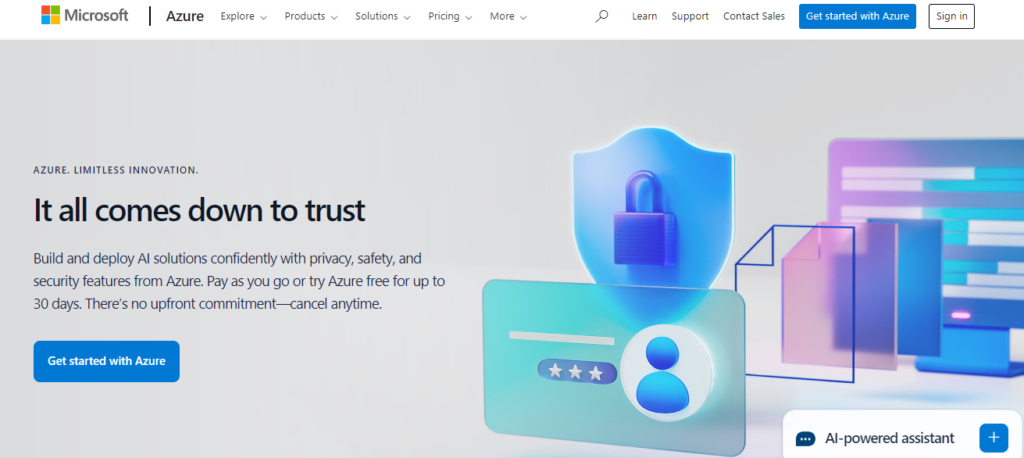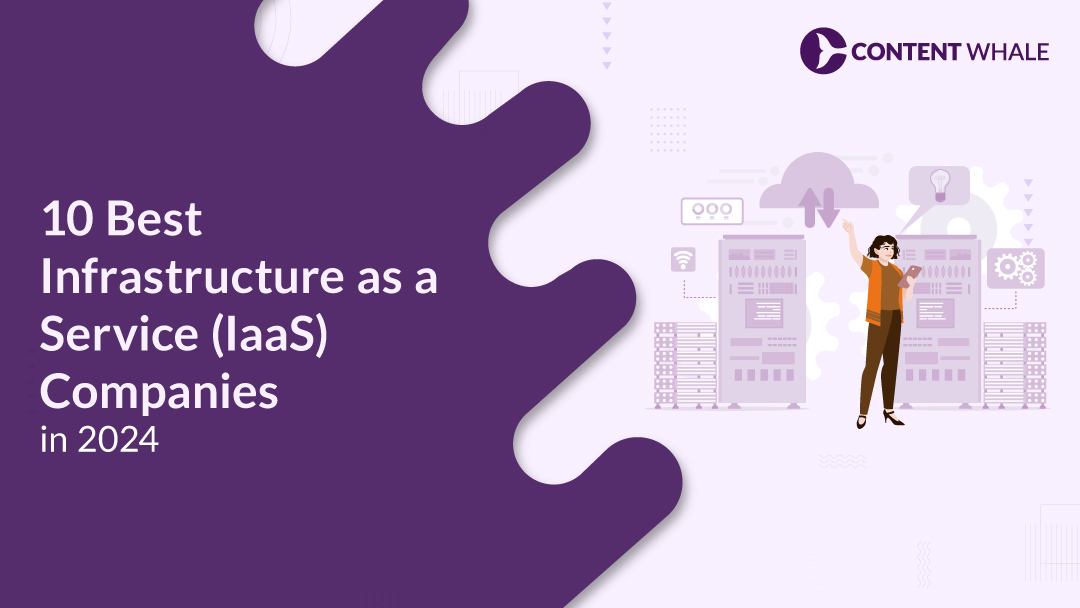As businesses grow more dependent on cloud infrastructure, choosing the right provider has become essential for staying competitive. Infrastructure as a Service (IaaS) offers flexibility, scalability, and cost-efficiency by outsourcing IT infrastructure to trusted cloud providers. From virtual machines to cloud storage, IaaS allows organizations to access cutting-edge technology without maintaining physical hardware.
To make your decision easier, we’ve compiled a list of the best IaaS providers in 2024. These top IaaS companies offer robust scalable cloud solutions, enhanced cloud security, and innovative features like AI and ML capabilities.
| # | Company Name | Why They Stand Out | Pricing |
| 1 | Amazon Web Services (AWS) | Largest global provider with extensive services including AI, IoT, and reliable compute | $0.1344/hour for t4g.xlarge (4 vCPU, 16GB RAM) |
| 2 | Microsoft Azure | Strong in hybrid cloud solutions and integration with Microsoft services like Office 365 | $0.166/hour for B4ms (4 vCPU, 16GB RAM) |
| 3 | Google Cloud Platform (GCP) | Excellent for data analytics and AI with global VPC for streamlined management | $0.150924/hour for e2-standard-4 (4 vCPU, 16GB RAM) |
| 4 | Alibaba Cloud | Leading cloud provider in Asia with cost-effective solutions and global expansion | $0.12/hour for ecs.g6.large (4 vCPU, 16GB RAM) |
| 5 | Oracle Cloud Infrastructure (OCI) | Best known for database management and high-performance workloads | $0.104/hour for VM.Standard 3.Flex (4 vCPU, 16GB RAM) |
| 6 | IBM Cloud | Known for strong multi-cloud and hybrid cloud environments with AI-powered services | $0.11/hour for standard VM configurations (4 vCPU, 16GB RAM) |
| 7 | DigitalOcean | Popular among developers for its simplicity and low-cost solutions for small businesses | $0.048/hour for Droplet (4 vCPU, 8GB RAM) |
| 8 | Linode | Favored by developers for Linux hosting and simple, predictable pricing | $0.05/hour for Linode 4GB (4 vCPU, 8GB RAM) |
| 9 | Rackspace | Specializes in managed cloud services with exceptional support and tailored solutions | Pricing available upon request (custom solutions based on client needs) |
| 10 | VMware | Leading in virtualization with robust hybrid and multi-cloud offerings | $0.12/hour for VMware Cloud on AWS (customizable configurations available) |
Whether you’re looking for public cloud services or hybrid cloud solutions, these providers have you covered.
1. Amazon Web Services (AWS)

Amazon Web Services (AWS) remains the leading choice among cloud providers, boasting a wide range of services that support businesses of all sizes. With over 200 comprehensive offerings, AWS delivers everything from virtual machines to AI and ML capabilities, making it one of the most versatile and scalable platforms.
Key Features:
- Elastic Compute Cloud (EC2): AWS’s EC2 service offers flexible and scalable compute power, allowing businesses to run applications seamlessly on cloud infrastructure. Users can choose their preferred configurations, making it highly customizable.
- Simple Storage Service (S3): Known for its robustness, S3 provides reliable cloud storage with advanced security features. It’s an essential tool for businesses looking for cost-effective and secure data storage.
- Global Infrastructure: AWS has a global reach with data centers spread across multiple regions, offering reduced latency and enhanced performance for its users.
- Pay-As-You-Go Pricing: One of AWS’s standout features is its pay-as-you-go pricing, which ensures that businesses only pay for what they use, making it a cost-effective IaaS solution.
2. Microsoft Azure

Microsoft Azure stands out as one of the top contenders in the Infrastructure as a Service (IaaS) space, offering a vast range of features and solutions. Known for its seamless integration with existing Microsoft products, Azure is a preferred choice for businesses looking to leverage hybrid cloud solutions and strong cloud security.
Key Features:
- Virtual Machines (VMs): Azure provides customizable virtual machines running on both Windows and Linux, making it versatile for a variety of workloads. Its auto-scaling capabilities ensure businesses only pay for the resources they use, making it a cost-effective IaaS option.
- Comprehensive Storage Options: Azure supports several types of cloud storage, including blob storage for unstructured data, and disk storage for high-performance applications. These options are highly secure and scalable, ideal for businesses with growing data needs.
- Global Availability: With over 60 regions and hundreds of data centers worldwide, Azure ensures high availability, reliability, and low latency for businesses, regardless of their location.
- Security and Compliance: Azure offers robust security features, including Azure Active Directory and Azure Security Center, ensuring strong identity management and advanced threat protection.
3. Google Cloud Platform (GCP)

Google Cloud Platform (GCP) is recognized for its innovative approach, especially in areas like AI and ML capabilities, making it a top choice for businesses focused on leveraging cutting-edge technologies. GCP stands out for its seamless integration with other Google products and its robust cloud infrastructure, making it an attractive option for tech-driven organizations.
Key Features:
- Kubernetes and Containers: GCP’s Kubernetes Engine is highly regarded for container management, enabling businesses to deploy and scale containerized applications efficiently.
- AI and Data Analytics: GCP is at the forefront of AI development, offering powerful tools like BigQuery for data analysis and TensorFlow for machine learning projects. These features make GCP an ideal platform for data-intensive and AI-driven businesses.
- Customizable Virtual Machines (VMs): With GCP, users can create highly customizable virtual machines based on specific requirements. This flexibility is ideal for organizations with varying workloads.
- Global Network and Security: GCP ensures cloud security with built-in encryption, DDoS protection, and a robust global infrastructure that spans multiple regions for low latency and reliability.
4. IBM Cloud

IBM Cloud focuses on delivering robust hybrid cloud solutions for enterprises that need a combination of public and private cloud infrastructure. Known for its extensive enterprise-grade services, IBM Cloud is often the go-to option for businesses with complex compliance and security requirements.
Key Features:
- High Customization and Flexibility: IBM Cloud’s Infrastructure as a Service (IaaS) offers highly customizable compute, storage, and networking resources, which can be tailored to the specific needs of businesses. This makes it ideal for enterprises that require flexible configurations to meet varied workloads.
- Enhanced Cloud Security: With features like IBM Cloud Security and Compliance Center, IBM Cloud integrates strong cloud security measures into every stage of the cloud deployment process. This is particularly important for industries handling sensitive data, such as healthcare and finance.
- AI and Data Capabilities: IBM Cloud leverages AI and ML capabilities to provide advanced analytics and automation solutions. This is beneficial for businesses looking to implement smarter decision-making processes and automation workflows.
- Multi-Cloud and Hybrid Options: IBM is a leader in hybrid cloud and multi-cloud setups, offering seamless integrations with on-premise and third-party cloud providers like VMware and Red Hat OpenShift. This flexibility enables businesses to easily migrate and manage their workloads across different environments.
5. Alibaba Cloud

As the leading cloud provider in Asia and the third-largest globally, Alibaba Cloud continues to make significant strides in the Infrastructure as a Service (IaaS) sector. Known for its affordability and wide-ranging features, Alibaba Cloud is especially popular among businesses seeking scalable and cost-effective solutions, particularly in the Asia-Pacific region.
Key Features:
- Elastic Computing Services: Alibaba Cloud offers powerful and scalable virtual machines through its Elastic Compute Service (ECS), which supports a variety of workloads, from general-purpose computing to AI-driven applications. The 9th generation ECS instances deliver a 30% performance improvement in search recommendations and faster database operations.
- AI and Big Data Integration: Alibaba Cloud is at the forefront of AI development with the launch of its Qwen 2.5 AI models, which support multiple industries such as automotive and gaming. These models enhance businesses’ capabilities to deploy AI solutions efficiently.
- Global Reach and Data Centers: With over 89 availability zones across 30 regions, Alibaba Cloud ensures global access to its cloud services. It also offers hybrid cloud solutions for businesses needing flexibility across public and private environments.
- Security and Compliance: Known for its robust cloud security, Alibaba Cloud integrates advanced data encryption, anti-DDoS protection, and compliance with global standards, making it a secure choice for businesses worldwide.
6. Oracle Cloud Infrastructure (OCI)

Oracle Cloud Infrastructure (OCI) is built to support mission-critical applications, providing a highly secure, scalable, and cost-efficient cloud infrastructure. OCI is particularly favored by enterprises requiring robust performance for high-compliance workloads, such as databases and ERP systems.
Key Features:
- High-Performance Computing (HPC): OCI offers top-tier performance with low-latency and high-throughput networks, supporting intensive workloads like simulations, large-scale analytics, and high-demand applications.
- Comprehensive Security: Security is a primary focus in OCI, offering a multi-layered defense with advanced features like adaptive authentication, built-in firewalls, and DDoS protection. Its granular customer isolation further enhances cloud security by separating resources and network traffic.
- Guaranteed SLAs: OCI provides 99.9% availability SLAs, ensuring high availability across its regions and fault domains, which are designed to handle hardware failures and maintenance seamlessly.
- Integration with VMware and Microsoft Azure: Oracle’s partnerships with VMware and Microsoft Azure allow businesses to run hybrid cloud solutions with the benefits of both OCI and other platforms. This helps organizations maximize their cloud infrastructure without compromising on performance or security.
7. DigitalOcean

DigitalOcean is a highly popular cloud infrastructure provider among startups and small to medium-sized businesses due to its simplicity, affordability, and intuitive interface. Known for delivering fast, reliable, and scalable solutions, DigitalOcean is particularly favored by developers who need straightforward access to virtual machines and cloud resources without the complexity of larger platforms.
Key Features:
- Droplets (Virtual Machines): DigitalOcean’s core product, Droplets, are easy to set up and provide scalable cloud solutions with SSD storage. Starting at just $4 per month, businesses can quickly deploy virtual servers and scale as needed, making it a cost-effective IaaS choice for growing businesses.
- Kubernetes Support: DigitalOcean provides managed Kubernetes clusters at highly competitive pricing, making it a great choice for teams looking to deploy containerized applications without the high cost and complexity of other platforms.
- Strong Community and Documentation: With extensive documentation and a strong developer community, DigitalOcean provides plenty of support for troubleshooting and setup, which is particularly beneficial for smaller teams without large IT resources.
- Cloud Security: DigitalOcean includes advanced cloud security features, such as cloud firewalls and DDoS protection, ensuring that applications and data remain secure without requiring extensive configuration.
8. Linode

Linode, now part of Akamai, has long been a trusted name among developers for its focus on Linux-based virtual machines and its affordable pricing model. Known for its simplicity and performance, Linode is a solid choice for developers and small-to-medium-sized businesses looking for flexible cloud infrastructure without the complexity of larger providers.
Key Features:
- High-Performance Virtual Machines: Linode offers virtual machines that are optimized for performance, making it a popular choice for web hosting, app development, and small-scale cloud projects. Users benefit from its use of SSD storage and a high-speed network backbone, ensuring fast and reliable service.
- Transparent Pricing: Linode’s pricing starts at $5 per month, making it one of the most cost-effective IaaS options available. Its clear and predictable pricing model is especially appealing for developers who need to keep costs under control.
- Extensive API and Developer Tools: Linode provides a comprehensive API and various developer tools, including StackScripts and Terraform, allowing businesses to automate tasks and manage resources efficiently. This feature enhances its appeal to developers working on complex or automated projects.
- Global Infrastructure: With 11 global data centers, Linode ensures high availability and low latency for its users across different regions. This global reach makes it a reliable option for businesses with geographically distributed teams or customers.
- Security and DDoS Protection: Linode includes robust cloud security features, including DDoS protection and regular security updates, which help safeguard your applications and data from threats.
9. Rackspace

Rackspace is renowned for its exceptional managed cloud services, making it a standout option among cloud providers for businesses seeking robust Infrastructure as a Service (IaaS) solutions. With a primary focus on delivering a high level of customer support and expertise, Rackspace is well-suited for organizations that need help managing complex cloud environments.
Key Features:
- Managed Hosting Services: Rackspace offers a range of managed services, including bare metal servers and virtual machines for businesses that require dedicated resources. These options provide a balance between performance and customization, making Rackspace an ideal choice for companies with demanding infrastructure needs.
- Multi-Cloud Solutions: Rackspace’s multicloud approach enables businesses to use different public cloud platforms, including AWS, Microsoft Azure, and Google Cloud Platform. This allows organizations to choose the best cloud provider for each workload while relying on Rackspace’s support for integration and management.
- Hybrid Cloud Options: Combining the strengths of public and private cloud solutions, Rackspace delivers tailored hybrid cloud solutions that offer both scalability and security. Businesses can take advantage of the scalable cloud solutions of the public cloud while benefiting from the control and compliance of a private cloud.
- Security and Compliance: Rackspace emphasizes strong cloud security, offering DDoS protection, encryption, and compliance with industry standards. Its 24×7 support ensures that businesses have access to cloud engineers and security experts to help address any potential threats or vulnerabilities.
10. VMware

VMware is a leader in virtualization and cloud infrastructure, offering a comprehensive suite of tools designed for modern cloud environments. With its flagship VMware Cloud Foundation, the company provides a complete Infrastructure as a Service (IaaS) platform that supports both public and private cloud solutions, making it ideal for businesses of all sizes.
Key Features:
- vSphere for Virtualization: VMware’s vSphere platform is the backbone of its IaaS offering, enabling organizations to run and manage both virtual machines and Kubernetes workloads in the same environment. This streamlines cloud infrastructure management and reduces complexity.
- Hybrid Cloud Support: VMware’s Cloud Foundation simplifies the deployment of hybrid cloud solutions, combining on-premises infrastructure with cloud services. This gives enterprises the flexibility to scale resources as needed while maintaining control over critical workloads.
- AI and Machine Learning Integration: VMware has expanded its focus on AI, especially through partnerships with NVIDIA to enhance AI and ML capabilities on its cloud platform. This enables organizations to run high-performance AI workloads securely within their private or hybrid environments.
- Security and Disaster Recovery: VMware provides robust cloud security features, including encryption, DDoS protection, and advanced access controls. It also offers disaster recovery services through VMware Site Recovery, ensuring that businesses can recover their critical applications quickly in case of an outage.
Conclusion

As businesses continue to embrace digital transformation, choosing the right Infrastructure as a Service (IaaS) provider is more important than ever. Each of the best IaaS providers in 2024 offers unique advantages, whether you’re a startup seeking affordability or an enterprise requiring robust cloud security and scalable cloud solutions.
From AWS and Microsoft Azure to VMware and Rackspace, these top IaaS companies provide the infrastructure to meet a variety of business needs. Whether you’re focused on cutting-edge AI and ML capabilities or simple, cost-effective virtual machines, there’s a provider tailored to your organization’s requirements. Let us help you navigate these options and find the ideal cloud infrastructure solution to support your business growth.
_____
This blog is crafted by Content Whale, your trusted partner for high-impact, SEO-optimized content that delivers measurable results. If you’re looking to elevate your brand, boost your rankings, and outpace the competition, we’re here to help. Contact us today, and let’s create content that drives success and takes your business to the next level.
FAQs
1. What is IaaS?
Infrastructure as a Service (IaaS) is a cloud computing service that provides virtualized computing resources over the internet. It includes servers, storage, and networking, allowing businesses to scale their infrastructure without managing physical hardware.
2. What are the benefits of using IaaS?
IaaS allows businesses to reduce capital expenditures on physical servers and hardware. It provides scalable cloud solutions, improved disaster recovery, and high-performance computing for tasks like big data analytics and web hosting.
3. Which businesses should consider IaaS?
IaaS is suitable for a wide range of businesses, from startups looking for flexible solutions to large enterprises needing hybrid cloud solutions or public cloud services. It is especially beneficial for companies that require scalability, secure hosting, and high-performance workloads.
4. How does IaaS differ from PaaS and SaaS?
IaaS offers more control over the infrastructure, while Platform as a Service (PaaS) provides an environment for developers to build and deploy applications. Software as a Service (SaaS) delivers fully functional software over the cloud, with minimal management needed from users.
5. What are the common use cases for IaaS?
IaaS is commonly used for web hosting, virtual data centers, disaster recovery, and development/testing environments. It is ideal for handling high-traffic websites, scalable application development, and cost-effective backup solutions.
6. Is IaaS secure?
Yes, IaaS providers typically implement stringent cloud security measures, including data encryption, firewalls, and regular security updates. However, the level of security may vary by provider, so it’s important to choose one with strong compliance and security protocols.
7. How is IaaS billed?
IaaS operates on a pay-as-you-go pricing model, meaning businesses only pay for the resources they use. This can lead to significant cost savings compared to traditional infrastructure models where businesses must invest in hardware upfront.


